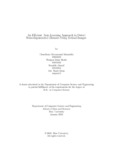| dc.contributor.advisor | Md. Ashraful, Alam | |
| dc.contributor.advisor | Rahman, Rafeed | |
| dc.contributor.author | Irfanuddin, Chowdhury Mohammad | |
| dc.contributor.author | Shafin, Wasique Islam | |
| dc.contributor.author | Ahmed, Koushik | |
| dc.contributor.author | Khan, Md. Hasib | |
| dc.date.accessioned | 2023-12-11T08:14:27Z | |
| dc.date.available | 2023-12-11T08:14:27Z | |
| dc.date.copyright | 2023 | |
| dc.date.issued | 2023-01 | |
| dc.identifier.other | ID 19101123 | |
| dc.identifier.other | ID 19101122 | |
| dc.identifier.other | ID 22241154 | |
| dc.identifier.other | ID 19101127 | |
| dc.identifier.uri | http://hdl.handle.net/10361/21954 | |
| dc.description | This thesis is submitted in partial fulfillment of the requirements for the degree of Bachelor of Science in Computer Science, 2023. | en_US |
| dc.description | Cataloged from PDF version of thesis. | |
| dc.description | Includes bibliographical references (pages 38-40). | |
| dc.description.abstract | Neurodegenerative disorders are diagnosed through undergoing brain MRI, CT scans, genetic testing, and various laboratory screening tests which are often tedious, time consuming and beyond the means of most people’s financial capabilities and sometimes health unconducive. To remedy this, we proposed an efficient deep learning approach to detect neurodegenerative diseases, for instance, Multiple Sclerosis, Parkinson’s disease, Amyotrophic Lateral Sclerosis, and Alzheimer’s disease using retinal images. Efficient convolutional neural network-based architectures are used to classify brain diseases. The system enables the detection of brain diseases from retinal images rather than brain images effectively. Through the proposed system, we are able to proactively detect such disorders simply through retinal scans which are faster and simpler compared to the scanning of the brain itself which requires expensive and sophisticated equipment. We conducted our research on a dataset containing retinal cross-sectional images of 21 Multiple Sclerosis patients and 14 healthy individuals. Our model achieved 100% accuracy in classifying all healthy and diseased individuals from retinal scans. | en_US |
| dc.description.statementofresponsibility | Chowdhury Mohammad Irfanuddin | |
| dc.description.statementofresponsibility | Wasique Islam Shafin | |
| dc.description.statementofresponsibility | Koushik Ahmed | |
| dc.description.statementofresponsibility | Md. Hasib Khan | |
| dc.format.extent | 40 pages | |
| dc.language.iso | en | en_US |
| dc.publisher | Brac University | en_US |
| dc.rights | Brac University theses are protected by copyright. They may be viewed from this source for any purpose, but reproduction or distribution in any format is prohibited without written permission. | |
| dc.subject | Neurodegenerative | en_US |
| dc.subject | Multiple sclerosis | en_US |
| dc.subject | Retinal images | en_US |
| dc.subject | Deep learning | en_US |
| dc.subject | Convolutional Neural Network | en_US |
| dc.subject | Optical coherence tomography | en_US |
| dc.subject.lcsh | Cognitive learning theory | |
| dc.subject.lcsh | Neural networks (Computer science) | |
| dc.subject.lcsh | Optical images | |
| dc.title | An efficient deep learning approach to detect neurodegenerative diseases using retinal images | en_US |
| dc.type | Thesis | en_US |
| dc.contributor.department | Department of Computer Science and Engineering, Brac University | |
| dc.description.degree | B.Sc. in Computer Science and Engineering | |

